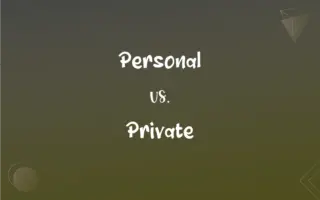Witch vs. Mage: What's the Difference?
Edited by Harlon Moss || By Janet White || Published on October 30, 2023
Witch typically implies a person, often a woman, practicing sorcery or magic, sometimes associated with malevolence. Mage generally denotes a practitioner of magic, often implying learned and skilled use, without a gender or moral bias.

Key Differences
Witch is a term that generally references an individual wielding magical powers. Historically and in various cultures, a witch has often been seen with a degree of suspicion or fear, associated frequently with dark or malevolent magic. On the other hand, the mage carries a different connotation. Mages are depicted typically as scholars of the mystical arts, often immersed in the study and application of magical sciences.
The characterization of a witch often varies widely across different cultural contexts and historical periods. Witches have been viewed through various lenses, from wise women and healers to ominous figures practicing malicious spells. Mages, conversely, might be seen as wise and benevolent, using their knowledge for the good of others, although this can also vary between narratives and traditions.
In literature and media, witches might be portrayed as individuals crafting potions, casting spells, or even forming pacts with supernatural entities. These portrayals often intertwine with historical accounts of witch trials and witch-hunting. The mage, however, often comes across as a sagacious figure, perhaps a mentor or a guide, using their arcane knowledge to assist on quests or provide wisdom.
Witches can be found in various folklore and fairy tales, often as antagonists or cautionary figures, warning against certain behaviors or illustrating moral tales. Mages, while also prevalent in lore and fantasy, might be seen as protectors or knowledgeable entities that help guide or shape events, and are often linked with academia or libraries within their respective worlds.
Gender and moral distinctions often differentiate witches and mages in traditional narratives. Witches are frequently female and, in many stories, employ their powers in morally questionable ways. Mages, in diverse stories, may be of any gender and generally use their powers in a wider moral and ethical range, from benevolent to malicious.
ADVERTISEMENT
Comparison Chart
Gender Association
Often female
Typically no gender bias
Moral Connotation
Often associated with dark/malevolent magic
Generally neutral, can be good, neutral, or evil
Representation
Can be healers or malevolent spellcasters
Often seen as learned scholars of magic
Cultural Perception
Seen as both wise women and malicious sorcerers
Usually respected or revered for their knowledge and power
Popular Media Image
Frequently featured as antagonists
Commonly portrayed as wise mentors
ADVERTISEMENT
Witch and Mage Definitions
Witch
Witch as a Sorcerer
The witch brewed a potent potion in her cauldron.
Mage
Mage as a Wizard
The mage summoned a protective barrier to shield the village.
Witch
Witch as a Healer
The village witch used herbs and spells to heal the sick.
Mage
Mage as a Mentor
The wise mage taught the hero about the arcane arts.
Witch
Witch as an Enchantress
The witch enchanted the prince, turning him into a frog.
Mage
Mage as a Magic User
The mage harnessed the energy from the ley lines to cast spells.
Witch
Witch as a Malevolent Figure
The wicked witch cursed the lands with eternal winter.
Mage
Mage as a Neutral Figure
The mage, indifferent to the world's affairs, secluded himself in his tower.
Witch
Witch in Modern Context
The modern witch embraced both pagan traditions and contemporary practices.
Mage
Mage as a Scholar
The mage spent decades studying ancient mystical texts.
Witch
A person, especially a woman, claiming or popularly believed to possess magical powers and practice sorcery.
Mage
A magician or sorcerer.
Witch
A believer or follower of Wicca; a Wiccan.
Mage
A magician, wizard or sorcerer.
Witch
(Offensive) An old woman considered to be ugly or frightening.
Mage
(obsolete) magus: a Zoroastrian priest.
Witch
A woman considered to be spiteful or overbearing.
Mage
A magician.
Witch
(Informal) A woman or girl considered to be charming or fascinating.
Witch
One particularly skilled or competent at one's craft
"A witch of a writer, [she] is capable of developing an intensity that verges on ferocity" (Peter S. Prescott).
Witch
To work or cast a spell on; bewitch.
Witch
To cause, bring, or effect by witchcraft.
Witch
To use a divining rod to find underground water or minerals; dowse.
Witch
A person who practices witchcraft.
Witch
(now usually particularly) A woman who is learned in and actively practices witchcraft.
Witch
An ugly or unpleasant woman.
I hate that old witch.
Witch
One who exercises more-than-common power of attraction; a charming or bewitching person.
Witch
One given to mischief, especially a woman or child.
Witch
(geometry) A certain curve of the third order, described by Maria Agnesi under the name versiera.
Witch
The storm petrel.
Witch
Any of a number of flatfish:
Witch
Glyptocephalus cynoglossus (Torbay sole), found in the North Atlantic.
Witch
Lepidorhombus whiffiagonis (megrim), found in the North Atlantic.
Witch
Arnoglossus scapha, found near New Zealand.
Witch
The Indomalayan butterfly Araotes lapithis, of the family Lycaenidae.
Witch
A cone of paper which is placed in a vessel of lard or other fat and used as a taper.
Witch
(intransitive) To dowse for water.
Witch
To practise witchcraft.
Witch
(transitive) To bewitch.
Witch
A cone of paper which is placed in a vessel of lard or other fat, and used as a taper.
Witch
One who practices the black art, or magic; one regarded as possessing supernatural or magical power by compact with an evil spirit, esp. with the Devil; a sorcerer or sorceress; - now applied chiefly or only to women, but formerly used of men as well.
There was a man in that city whose name was Simon, a witch.
He can not abide the old woman of Brentford; he swears she's a witch.
Witch
An ugly old woman; a hag.
Witch
One who exercises more than common power of attraction; a charming or bewitching person; also, one given to mischief; - said especially of a woman or child.
Witch
A certain curve of the third order, described by Maria Agnesi under the name versiera.
Witch
The stormy petrel.
Witch
A Wiccan; an adherent or practitioner of Wicca, a religion which in different forms may be paganistic and nature-oriented, or ditheistic. The term witch applies to both male and female adherents in this sense.
Witch
To bewitch; to fascinate; to enchant.
[I 'll] witch sweet ladies with my words and looks.
Whether within us or withoutThe spell of this illusion beThat witches us to hear and see.
Witch
A female sorcerer or magician
Witch
A being (usually female) imagined to have special powers derived from the devil
Witch
An ugly evil-looking old woman
Witch
Cast a spell over someone or something; put a hex on someone or something
FAQs
Are witches in all cultures viewed the same?
No, cultural perceptions of witches vary widely.
Does "mage" imply a particular moral alignment?
No, mages can be good, evil, or neutral, depending on the context.
Does "witch" always imply a female practitioner of magic?
Traditionally, yes, but modern usage can refer to any gender.
Is a witch typically depicted as evil?
Often, but witches can also be neutral or good in some contexts.
Does a witch always use spells and potions?
Commonly, but depictions can vary with some focusing more on other aspects of magic.
Is "mage" a gender-specific term?
No, "mage" can refer to a magic user of any gender.
Is it common for a mage to be involved in battles or conflicts?
Sometimes, mages can be depicted as active participants or strategists in conflicts.
Is a mage usually a solitary figure?
Not necessarily, mages can be hermits, scholars, mentors, or active community members.
Are witches often associated with specific historical events?
Yes, especially with the witch trials in various periods of history.
Do mages typically hold a scholarly or academic position in narratives?
Often, mages are depicted as knowledgeable or wise, sometimes with academic connections.
Can a mage also be a leader or ruler?
Yes, mages are sometimes depicted as rulers, advisors, or leaders.
Do mages often work in groups or guilds in fictional settings?
Frequently, mages can be part of guilds, schools, or other organizations in fantasy narratives.
Are witches usually solitary in folklore and myth?
Often, but there are numerous stories of witches in covens or groups.
Can a witch be a force for good?
Absolutely, many narratives depict witches using their powers for benevolent purposes.
Are mages often seen mentoring others in magical arts?
Yes, mages are often portrayed as teachers or mentors in magical and mystical arts.
Is the term “witch” always associated with traditional magic practices?
Often, but “witch” can also refer to characters in various fictional contexts.
Can a mage use different types of magic?
Yes, mages are often portrayed using various forms of magic, from elemental to arcane.
Does witchcraft always involve supernatural entities?
Not always, depictions of witchcraft vary, with some focusing on nature or elemental magic.
Is a witch's power inherent or learned?
It varies—witches can have innate powers or learn through study and practice.
Are mages often connected to specific mythologies?
Mages appear in various mythologies and can be associated with various deities or magical traditions.
About Author
Written by
Janet WhiteJanet White has been an esteemed writer and blogger for Difference Wiki. Holding a Master's degree in Science and Medical Journalism from the prestigious Boston University, she has consistently demonstrated her expertise and passion for her field. When she's not immersed in her work, Janet relishes her time exercising, delving into a good book, and cherishing moments with friends and family.
Edited by
Harlon MossHarlon is a seasoned quality moderator and accomplished content writer for Difference Wiki. An alumnus of the prestigious University of California, he earned his degree in Computer Science. Leveraging his academic background, Harlon brings a meticulous and informed perspective to his work, ensuring content accuracy and excellence.







































































